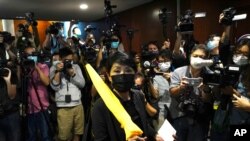Pro-democracy lawmakers in Hong Kong staged one final act of defiance in the city’s Legislative Council on Thursday before going through with a mass resignation over the dismissal of four of their colleagues.
Lam Cheuk-ting unfurled a banner from a balcony of the chamber denouncing Chief Executive Carrie Lam as the legislature gaveled into session.
Fifteen pro-democracy lawmakers pledged to resign en masse on Wednesday, hours after their four colleagues, Alvin Yeung, Denis Kwok, Kwok Ka-ki and Kenneth Leung, were disqualified by the government. The quartet’s dismissal came after a Chinese legislative committee ruled that Hong Kong’s government could disqualify any lawmaker believed to be a threat to national security without going through the courts.
The disqualifications of the four lawmakers were denounced by the United States and other Western nations. White House national security adviser Robert O’Brien said the move showed Beijing’s communist government has “flagrantly violated its international commitments” and was bent on “expanding one party dictatorship in Hong Kong.”
The dismissals and the subsequent resignations of the other 15 pro-democracy lawmakers will leave the 70-seat Legislative Council with only pro-Beijing lawmakers.
The four disqualified lawmakers were also among 12 legislators barred from running in elections initially scheduled to be held in September. The government has postponed the elections for a year, citing the novel coronavirus pandemic.
The disqualifications appear to be the latest effort by Beijing to quell pro-democracy forces in the semi-autonomous city, which was engulfed by massive and often violent pro-democracy demonstrations in the last half of 2019.
The mainland’s communist government passed a sweeping new security law in June in response to the demonstrations, under which anyone in Hong Kong believed to be carrying out terrorism, separatism, subversion of state power or collusion with foreign forces could be tried and face life in prison if convicted.
Western governments and human rights advocates say the measure effectively ends the self-autonomy guaranteed under the pact that switched control of Hong Kong from Britain to China in 1997.





